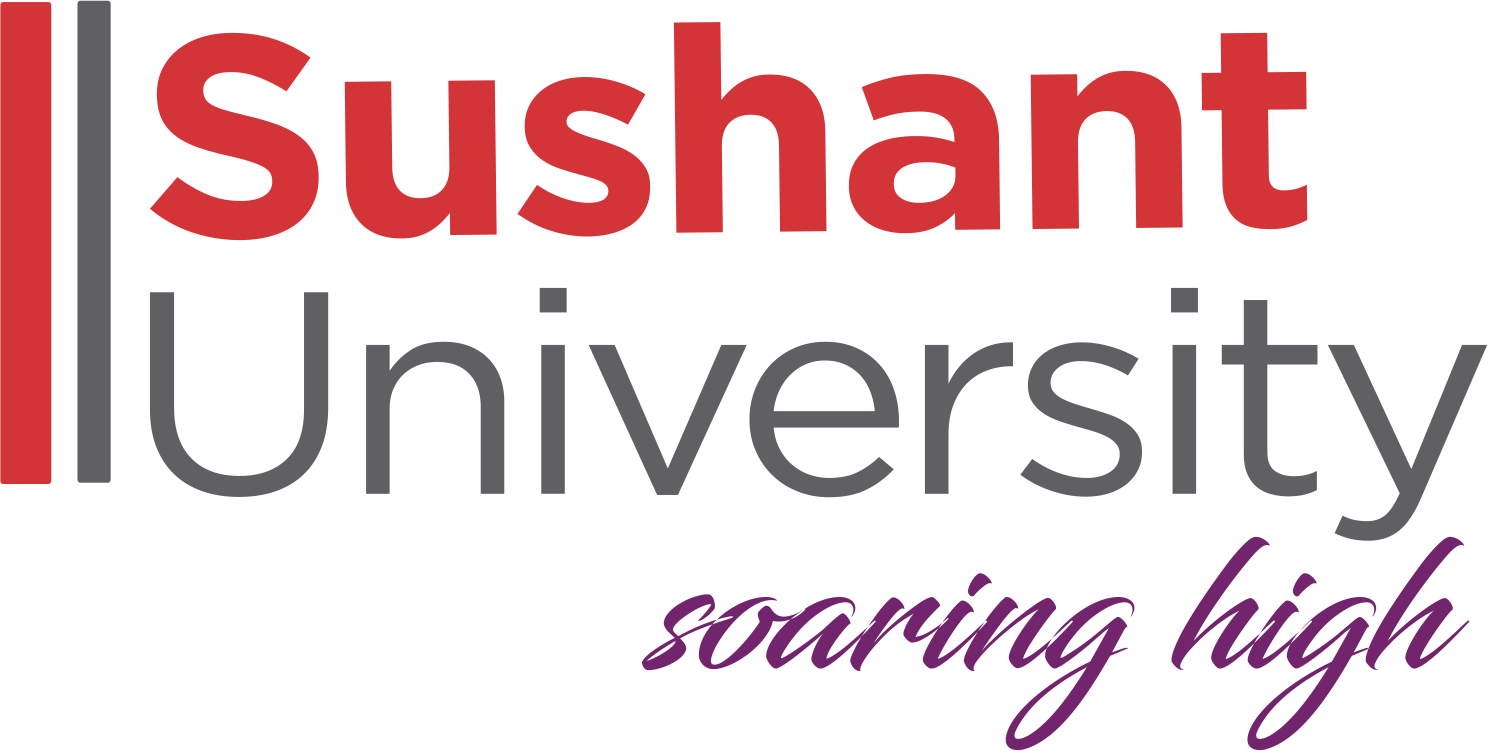Trans-disciplinary Learning (TDL) at SU
Programme Objective and Rationale
At Sushant University, we encourage inter and trans-disciplinary approach to teaching and learning across all programmes of study for a holistic learning and all round development. The central idea of the approach is to educate students in the exploration and utilization of diverse approaches to critical thinking and to participatory and interactive learning so that they make connections among multiple disciplines, work jointly with students from other Schools on an area of common interest, co-create knowledge, construct their own meaning and transfer the learning to real world applications. To expand learning opportunities for students in a programme, there are trans-disciplinary modules or courses which provide opportunities for higher-level learning outcomes, besides bringing flexibility in programme delivery. Such courses constitute an elective programme embedded in all programmes of study of the University.
Each semester Schools offer a basket of Trans Disciplinary Learning (TDL) courses to students of all other Schools. Students enroll in a TDL course offered by a School different from their home School and undertake and complete a project activity under the guidance of the respective faculty mentor. The purpose is to undertake concentrated study in one area while simultaneously developing an understanding of other disciplines and the connections among disciplines. The expanded learning opportunities, so offered, can provide very interesting course combinations in the context of Flexible and Choice Based Credit System too. With successful application of this approach students may integrate knowledge and modes of thinking drawn from two or more disciplines for a process improvement or to brainstorm and arrive at a better solution to a problem.
Target Audience
There are approximately 1400 students choosing a subject from a list of 32 subjects offered. All students of 4th, 6th and 8th Semester are required to opt for one subject of TDL. They will be choosing one subject every semester till the completion of the course.
After registering for a course, a student has to attend 10 hrs of sessions for the subject chosen. Internal and External assessments both form part of evaluations. The classes for TDL are scheduled on every Tuesday for entire University in order to streamline the process.
Variety of TDL subjects
The basket of subjects (Applicable for 4th, 6th and 8th semester students) which has been offered in Even Semester 2022 is as follows:
|
S. No
|
School Offering TDL
|
TDL Course Name
|
|
1
|
SET
|
IOT Based Smart Agriculture Monitoring And Irrigation System - (NOT FOR SET STUDENTS)
|
|
2
|
SET
|
Cyber Security - (NOT FOR SET STUDENTS)
|
|
3
|
SET
|
Robotic Process Automation - (NOT FOR SET STUDENTS)
|
|
4
|
SET
|
Blockchain Technology - (NOT FOR SET STUDENTS)
|
|
5
|
SHM
|
Famous Restaurants Of Delhi NCR - (NOT FOR SHM STUDENTS)
|
|
6
|
SHM
|
Study On Boulangerie And Patisserie Products And Manufacturing Equipments - (NOT FOR SHM STUDENTS)
|
|
7
|
SHM
|
Pre- Requisites To Start Up Your Own Culinary Venture - (NOT FOR SHM STUDENTS)
|
|
8
|
SHS
|
Radiation Hazards - (NOT FOR SHS STUDENTS)
|
|
9
|
SHS
|
Contagious Disease And Its Prevention - (NOT FOR SHS STUDENTS)
|
|
10
|
SHS
|
Introduction To Eye & Vision Care - (NOT FOR SHS STUDENTS)
|
|
11
|
SHS
|
Cyber Psychology - (NOT FOR SHS STUDENTS)
|
|
12
|
SHS
|
Ongoing Techniques And Methods Used In Diagnostic Centres - (NOT FOR SHS STUDENTS)
|
|
13
|
SOB
|
Strategies For Sustainability - (NOT FOR SOB STUDENTS)
|
|
14
|
SOB
|
Financial Planning - (NOT FOR SOB STUDENTS)
|
|
15
|
SOB
|
Basics of Income Tax - (NOT FOR SOB STUDENTS)
|
|
16
|
SOB
|
Basics of Operations Management - (NOT FOR SOB STUDENTS)
|
|
17
|
SOB
|
Recent HRM Practices In Indian MNCs - (NOT FOR SOB STUDENTS)
|
|
18
|
SOD
|
Design Thinking - (NOT FOR SOD STUDENTS)
|
|
19
|
SSPD
|
Gender Sensitive Urban Planning - (NOT FOR SPD STUDENTS)
|
|
20
|
SOD
|
Spirituality Of The Future -II - (NOT FOR SOD STUDENTS)
|
|
21
|
SOD
|
Sketch-Noting - (NOT FOR SOD STUDENTS)
|
|
22
|
SOD
|
Fashion Styling/Culture - (NOT FOR SOD STUDENTS)
|
|
23
|
SOL
|
Sensitisation Of Youth On Social Issues - (NOT FOR SOL STUDENTS)
|
|
24
|
SOL
|
Social Construction And Women Empowerment - (NOT FOR SOL STUDENTS)
|
|
25
|
SOL
|
Events That Changed The World - (NOT FOR SOL STUDENTS)
|
|
26
|
SOL
|
Contract Drafting - (NOT FOR SOL STUDENTS)
|
|
27
|
SOL
|
Fundamentals Of Health Law - (NOT FOR SOL STUDENTS)
|
|
28
|
SSAA
|
LIDAR Technology And Its Use In General Life - (NOT FOR SAA STUDENTS)
|
|
29
|
SSAA
|
Basics Of Remote Sensing And GIS - (NOT FOR SAA STUDENTS)
|
|
30
|
SSAA
|
Understanding The Spatial Character Of Public Spaces In Cities - (NOT FOR SAA STUDENTS)
|
|
31
|
SSAA
|
Sustainable Development And Climate Change - (NOT FOR SAA STUDENTS)
|
|
32
|
SSAA
|
Cognitive Understanding/Learning : Places & Spaces - (NOT FOR SAA STUDENTS)
|
Overview of Assessment criteria in DTP
Students would be assessed continuously at three assessment points during the course. Course assessment is based on a student’s activity (records/ evidence of his/her performing and learning).
Internal Assessment I and II, each of 30 marks is mandatory (i.e. total internal assessment of 60 marks). Depending upon the subject, the Internal assessments can be assignments/Presentation/viva/any project work or in any other form or a combination of 2 modes of assessment.
Faculty is required to mandatorily keep a record of both assessments, as they shall be mapped in ERP accordingly.
Faculty should share with students the assessment criteria and the DTP (only student version) in initial classes so that there is no ambiguity with regards to the same.
External Assessment: For the final (40 marks) assessment, the final viva shall take place as per date announced in datesheet. A panel of faculty will Judge the knowledge and understanding of the subject.
Conclusion:
A trans-disciplinary learning environment helps in bringing education at SU close to real life. It helps prepare our students to understand and respond to the conditions and concerns of the contemporary world and work towards solving the same, both at the local and global levels. This approach and practice being in tune with the global best practices in higher education too creates richer contexts for student exchange programmes with our foreign partners helping them get further sensitized to global and local cultural issues.







